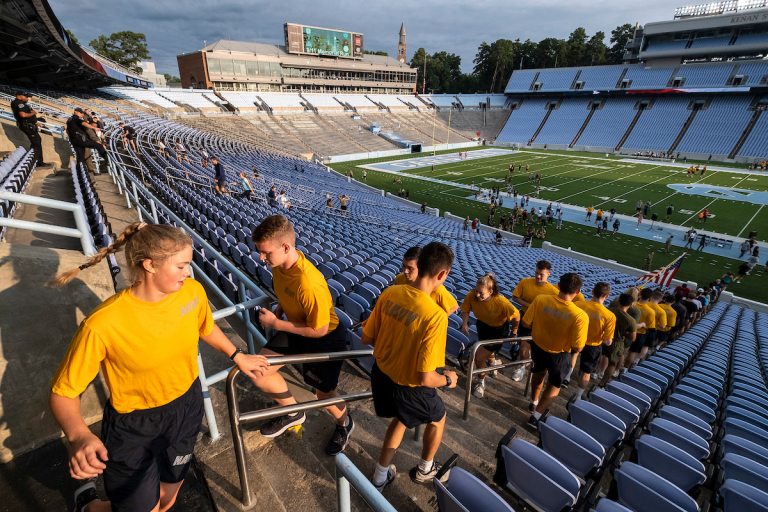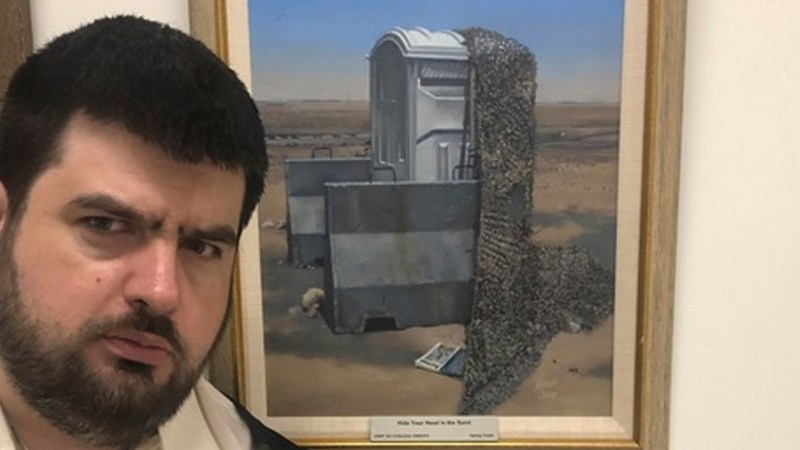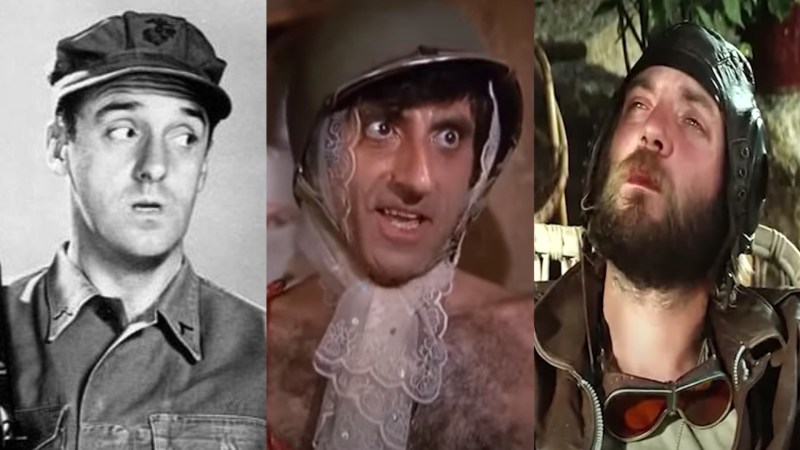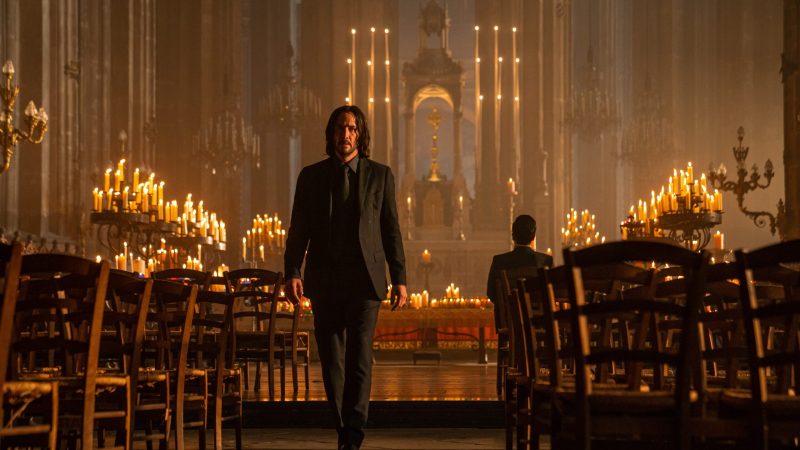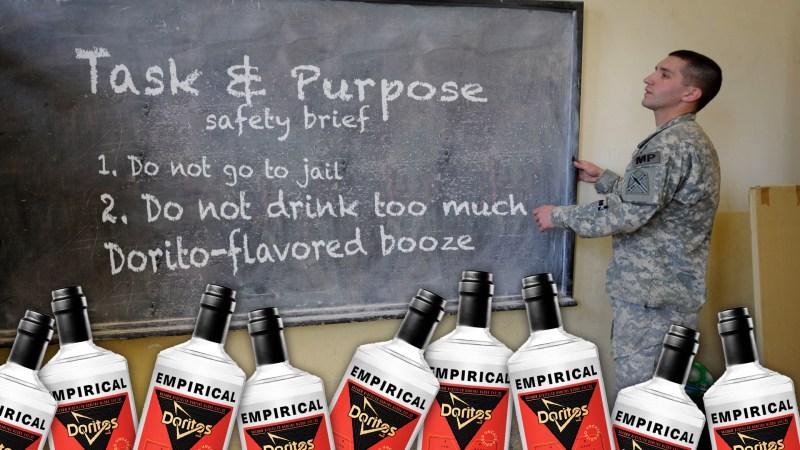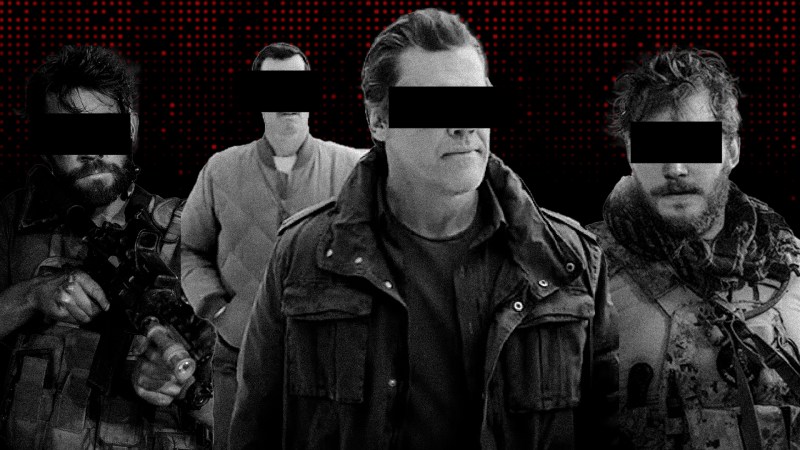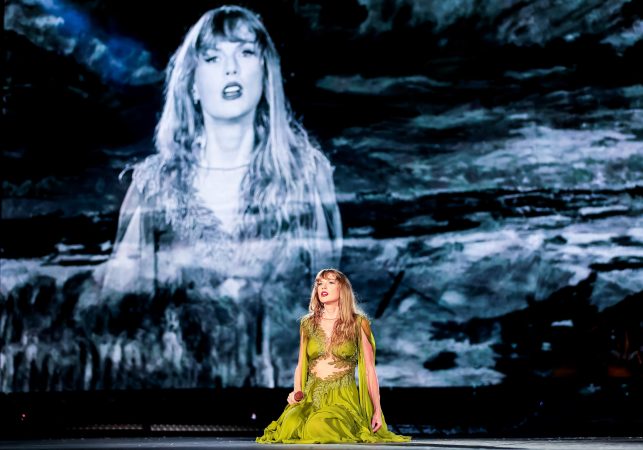Despite the muggy North Carolina morning air, close to 500 sleepy-eyed college students were inside a giant football stadium at 6 a.m., ready to #NeverForget a day they literally can’t remember.
I was at the football stadium at the University of North Carolina at Chapel Hill, with my daughter, who is 16 and a junior in high school, and a friend of hers from her cross-country running team. We were there, along with the 500 or so college students — “kids,” I can’t help but call them — for the annual 9/11 Memorial Stair Climb, which UNC’s Army ROTC unit sponsors each year inside the school’s 63,000-seat Kenan Memorial Stadium. I’ve been bringing her and her sister since they were in grade school, hoping the morning of glowing lights, green grass, and burning thighs eventually morph into curiosity and respect for the event that defined the adult lives of my generation of Americans.
But while plenty of ‘civilians’ like us show up each year for the stair climb, most of the crowd is undergrads, largely cadets from the school’s three ROTC units or athletes on UNC’s NCAA sports teams. For about 40 minutes we all run up and down the stadium’s 2,000-odd stairs so that, as the slogan shining from the scoreboard says, “we will never forget.”
Subscribe to Task & Purpose Today. Get the latest military news and culture in your inbox daily.
Except that this morning, I realized as I looked around the stadium at the hundreds of students chugging up and down the stairs: they don’t remember it at all. Virtually every undergraduate at UNC — and every college kid in America — was born after September 11, 2001. The few who might have already passed their 22nd birthday by Monday certainly have no memory of 9/11.
As the director of UNC’s Army ROTC, Lt. Col. Dan Hurd notices the same thing every day.
“You know, every year we continue it, there’s more and more ROTC students, more athletes, more students — they were not born,” said Hurd.
Hurd, like every member of the US military in the last two decades, spent his career in the shadow of 9/11. He watched the coverage of 9/11 as a cadet at the U.S. Military Academy at West Point and by 2007 had been awarded a Silver Star for combat in Iraq with the 10th Mountain Division. He later served with 3rd Ranger Battalion and then as the operations officer at Ranger School before taking teaching positions at West Point and then UNC.
At Ranger School, he learned that 9/11 had affected his generation of soldiers even more immediately than he realized at the time. Leaving the gym one day in 2017, he recognized one of the school’s senior instructors, a Sergeant First Class.
“We looked at each other and said, ‘You look familiar,’ ‘You look familiar, too,’” Hurd said. “We went over our careers and couldn’t figure it out. Then he said, ‘Oh shit, did you go to West Point?’”
The now-senior NCO had been a cadet with Hurd. But after 9/11, he quit to enlist. He told Hurd: “I didn’t want to miss the war.” (With a resigned laugh at the length of the post-9/11 wars, Hurd responded: “You didn’t miss much.”)
In 2023, Hurd says, losing combat-eager cadets to war is not a problem he faces at UNC. His students, he said, are the first cohort of future Army leaders who connect to 9/11 not as a national trauma they remember but as the backbone of the military they will soon lead.
“I think the fact that they show up and want to come means they understand the importance of the day,” Hurd says. “They don’t have to have that visceral image of what it felt like that day to know the world changed. They are living through the changes.”
The stair climb, Hurd said, is a key generational connection. While the UNC event draws plenty of “civilians,” including veterans groups and local fitness and running clubs, the heavy majority of the climbers each year are undergraduate groups: all three service branches of UNC’s ROTC and their counterparts from nearby Duke and St. Augustine University, and at least 200 athletes from UNC’s NCAA sports teams.
For the first time this year, even the most senior ROTC student at UNC was born after 9/11. Mohammad Qassem, UNC’s battalion commander, and the unit’s student leader, was born in May 2002. Since joining ROTC as a freshman, Qassem has graduated from enlisted basic training — rare for non-prior service ROTC cadets — and Airborne school, along with several ROTC-specific leadership courses. After graduation, he hopes to end up in the infantry.

Qassem grew up in nearby Garner, NC, but spent much of his youth living part-time in Palestine, an experience that moved him toward military service in the US.
“I always knew I wanted to serve,” Qassem said. “Definitely growing up part-time in the Middle East, you see the difference just in lifestyle and you know what you want to defend and what you want to do with your life. I knew I wanted to make a difference, and I knew that I could if I became an army officer.”
Perhaps appropriately, Qassem “remembers” 9/11 differently than Hurd might suspect. While Hurd views Qassem and his peers as a generation shaped by 9/11, Qassem views the attacks and subsequent wars as a fading moment of national identity.
“I think it can be summed up with one word: solidarity,” said Qassem. 9/11 and the global war on terror, he says, “was a moment of solidarity, coming together as a community and not only remembering the attack that led to the global war on terror but just being a community for that single moment, sharing in the struggle. You’ll see it just today. I mean, every year we hold the run, and every year you get to watch the community come together.”
For years, the ROTC cadets matched the other climbers in shorts and t-shirts. No more. Now every cadet, plus Hurd, carries at least a 35-pound ruck. The groups of firefighters who participate in full turnout gear, Hurd said, inspired the change.
“The first few years was kind of a free-for-all,” said Hurd. “After watching the firefighters go up stairs with their oxygen bottles, it’s like, why aren’t we carrying our combat load?”
By 7 a.m., nearly everyone is done (I’d kept up with my two high school athletes for about, oh, 8% of the stairs). As groups knocked out memorial push-ups and stretches, we took pictures — social media, after all, is the true glue between generations.

As our trio headed to Sutton’s, a favorite Chapel Hill breakfast place, I looked at the students and cadets and thought how, even decades apart, they looked no different to me than I had been at their age. Hurd, at the far end of a career his students are just beginning, agrees.
“I don’t see a difference. They have the same motivation to serve, we have the same type of people here at UNC that I remember going to West Point with,” said Hurd. “Some of the veterans groups afterwards were asking ‘What do you feed these kids?’ They are still amped up. And I think that energy comes from being a part of something that they didn’t understand, they didn’t live through, but now they get to be a part of something that drives most of our profession.”
The latest on Task & Purpose
- Boot camp obstacle course was no problem for 4-foot-7-inch Marine
- Army’s pre-boot boot camp to become permanent
- Navy commander fired for “loss of confidence”
- Marine vet charged with false Purple Heart claim, benefits fraud
- Three Navy SEAL commanders face charges in Hell Week death

